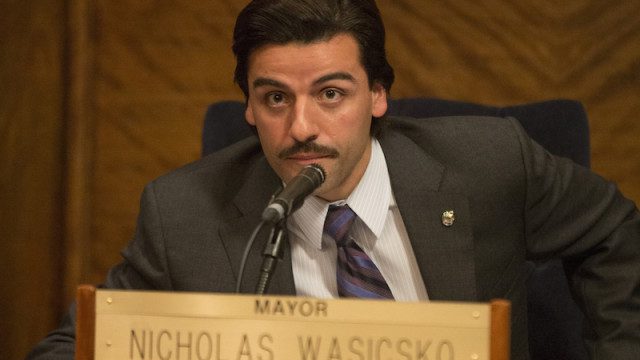Show Me a Hero really wastes no time, does it? The show is clearly aiming at an American epic, a story spanning years, with a huge cast of characters. So far it’s succeeding on all fronts.
It would be misleading to say that “Part Two” picks up where “Part One” left off. “Two” begins with a time jump – now we’re in January 1988. Nick has been mayor of Yonkers for almost a year, and the city is still being called in front of Judge Sands (Bob Balaban’s steely delivery is perfect). Everything I said in my review of “Part One,” about the citizens’ obdurate refusal to change, is magnified tenfold in “Part Two.”
Much of this episode unfolds as a bizarre twist on the familiar bottle episode. Don’t get me wrong, there are plenty of locations and characters, but it feels more claustrophobic than the first installment. City Hall is now a Kafkaesque sideshow, where men in suits show up to be screamed at until they go home. These were the toughest scenes of “Part Two,” and that’s due in no small part to Paul Haggis’s direction. The cries of the townspeople become an oppressive din, and any attempt at discourse is useless. Once talk of race and, inevitably, religion comes up, the City Hall scenes become downright uncomfortable (“Another Hebrew plot exposed,” snorts Jon Bernthal’s Michael Sussman). Even Mary Dorman (an excellent Catherine Keener), staunchly opposed to the housing plan, blanches at the introduction of religion into the debate.
What “Part Two” did so successfully is further define and develop Show Me a Hero‘s characters. “Part One” gave us some broad strokes, but “Part Two” pumped the brakes a bit to show us that Alfred Molina’s Hank Spallone is an opportunistic prick who will vote no on the housing bill, even if it means going to jail – because it likely means he’ll win the next election. The way Molina constantly chews on a toothpick would be a cliched affectation in a lesser actor’s hands, but he makes it work. Somehow.
This characterization is a breath of fresh air, because “Part Two” shows Hero‘s more cynical side. People are reduced to numbers, statistics, commodities. Any attempt at change is punished. Skipper, now an expectant father, promises to go back to school to study “computers or some shit.” Minutes later, respiratory problems kill him offscreen (the way Hero shows both sides of Skipper – the loving boyfriend and fierce, unsympathetic drug runner – is a remarkable amount of detail given to a character who dies this early). Norma O’Neal is going blind at the age of 47. She tries to help herself out in one small way – putting pink nail polish on the buzzer to her daughter’s apartment – but she too is stymied, as the nail polish is gone by the next day.
“Part Two” was a more gut-wrenching episode than “Part One.” It was, at times, downright brutal, although never less than enthralling. It’s tempting to try to live by Nick’s maxim, and do things as dispassionately as you can. But you can’t watch Show Me a Hero without passion. David Simon makes you care.
A Few Thoughts
-
“Councilman Longo, what the fuck?”
-
“Fuck Nick Longo. He should get ass cancer”
-
“It’s just politics, Vinni.” “It’s addictive, is what it is”
-
“They don’t live the way we do”
-
Wonderful closing scene between Nick and Mary. Beautiful human moments like that are what keep Show Me a Hero from devolving into bitter finger-wagging


